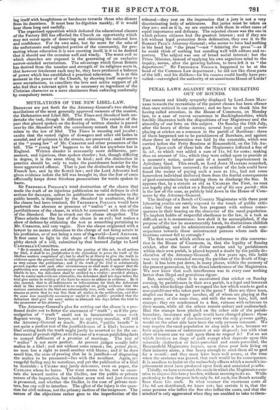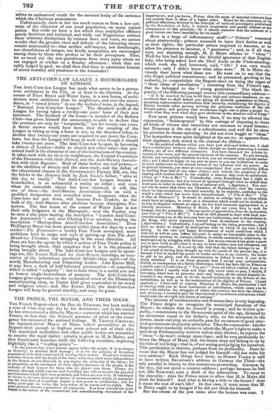PENAL LAWS AGAINST SUNDAY CRICKETING OUT OF BOUNDS.
THE earnest and kindly sympathy displayed by Lord Joux MAN- NERS towards the recreations of the poorer classes has been oftener than once noticed in our columns ; and we have to thank him for having called attention, in the House of Commons, on Monday last, to a case of recent occurrence in Buckinghamshire, which forcibly illustrates both the dispositions of our Magistracy and the absurdity of our laws on this subject. On Sunday the 16th July, after the hours of divine service, several boys and youths were playing at cricket on a common in the parish of Burnham: three of them happened not to be parishioners of Burnham, and against those three an information was laid by the constable, which was carried before the Petty Sessions at Beaconsfield, on the 7th Au- gust. Upon each of these lads the Magistrates inflicted a fine of 3s. 4d., to which was added a sum of 1 Is. 8d. for costs; making thus an amount of 15s., which they were called upon to provide at a moment's notice, under pain of a month's imprisonment in Aylesbury Gaol. This result, as Lord JOHN MANNERS remarked, must inevitably have occurred; for neither of the lads could have found the means of paying such a sum as 15s., had not some benevolent individual sheltered them from the fearful consequences of gaol-contamination by enabling them to discharge the fine. It appears that, by a statute as old as CHARLES the First, no man can legally play at cricket on a Sunday out of his own parish : this is the law of the ease, as publicly laid down in the House of Com- mons by the Attorney-General.
The dealings of a Bench of Country Magistrates with three poor labouring youths are rarely exposed to the touch of public criti- cism; but they are not the less pregnant with serious conse- quences in their bearing on the character of the rural population. To implant habits of respectful obedience to the law, is a task as difficult as it is momentous : how shall it be accomplished, if the purpose of the law be unwarrantably harsh, its distinctions childish and quibbling, and its administrators regardless of ruinous con- sequences towards those uninstructed persons whom such dis- tinctions cannot fail to entangle ?
The first remark which strikes us in reference to this conversa- tion in the House of Commons, is, that the legality of Sunday cricket, after the hours of divine service and by parishioners within their own parish, is placed beyond a doubt by the public de- claration of the Attorney-General. A few years ago, this habit was very widely extended among the parishes of the South of Eng- land: it has been put down, in many places, within the memory of the present generation, by the direct interference of the Magistrates. We now know that such interference was in every case nothing better than illegal and gratuitous rigour.
But, secondly, when it is ascertained that cricket on Sunday evening, by parishioners in their own parish, is a legal and innocent act, with what feelings shall we regard the law which sends to gaol a non-parishioner who takes part in the game ? Here are three boys, singled out from a larger number, all of whom are playing at the same game, at the same time, and with the same bats, ball, and stumps: they are condemned to a fine, ruinous with reference to their means, while all the others remain unhurt and undisturbed. Had the stumps been pitched on the other side of the parish- boundary, innocence and guilt would have changed places : those who on the one side of the boundary were the only persons guilt', would on the other side have been the only persons innocent. R e may require the rural population to obey such a law, because we have ample means of enforcement at our disposal; but with what show of reason can we call upon them to respect it? For an act which involves no tinge of guilt except what depends upon this miserable distinction of intra-parochial and extra-parochial, the Beaconsfield Magistrates impose, upon three poor lads living on their industry alone, a fine heavy enough to send them all to gaol for a month : and they must have been well aware, at the time when the sentence was passed. that such would be its consequence. It is needless to insist on the melancholy effects which a month's im- prisonment must have produced upon fresh and untainted youths.
Thirdly, we have to remark the mode in which the Magistrates con- trive to impose this heavy burden, without seeming to do so. While professing to tine the poor lads only 3s. 4d. each, the Bench actually fines them 15s. each. In what manner the enormous costs of 11s. 8d. are distributed, we know not ; but certain it is, that the same persons who inflict the fine also inflict the costs, and that the mischief is only aggravated when they are enabled to take to them-
selves an undeserved credit for the nominal lenity of the sentence which the Chairman pronounces. Unfortunately, there is but too much reason to form a low esti- mate of the character of our rural population, on many capital points. But while we have a law which thus multiplies offences purely factitious and technical, and while our Magistrates enforce these arbitrary distinctions by ruinous fines and costs, we cannot wonder that the genuine vices and defects of the labouring classes remain unattended to—that neither self-respect, nor forethought, nor cheerfulness of temper, nor kindly sympathies, are encouraged among them by those who profess to be their preceptors. First, let us weed out the non-parishioners from every party whom we see engaged at cricket on a Sunday afternoon : when they are safely lodged in gaol, we shall then find time to administer lessons of sound morality and prudence to the remainder!



























 Previous page
Previous page